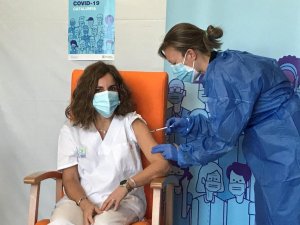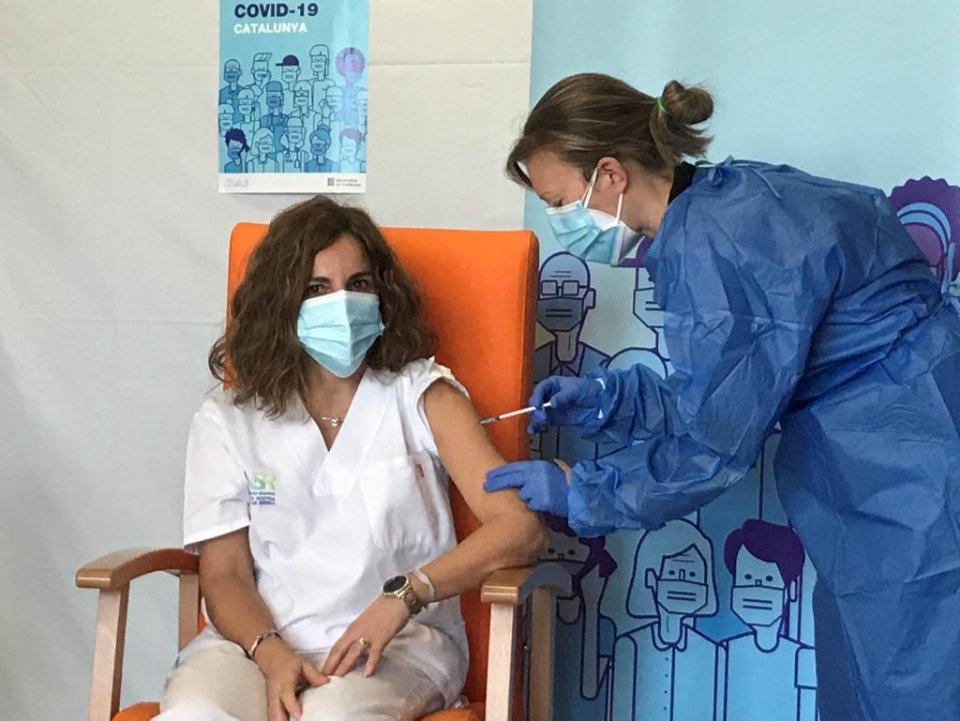Latest: Coronavirus in Spain figures (9 Feb)
ALSO READ: Details of curfews & restrictions for all regions of Spain during ‘State of Alarm’
Please support Spain in English with a donation.
Click here to get your business activity or services listed on our DIRECTORY
Report below updated in Spain at 18.45h on Tues 19 Jan
CORONAVIRUS in SPAIN – latest Health Ministry figures
The latest official figure* released by the Spanish Health Ministry on Tuesday 19 January for the number of people who have tested positive for Coronavirus (Covid-19) since the start of the pandemic is now 2,370,742. This is an overall increase of 34,291 against the figure released on Monday. The ministry claims that 15,578 of these infections have occurred in the past 24 hours.
The peak of recorded infections for a 24-hour period during what is now being referred to as the ‘third wave’ in Spain was on 15 January, when 17,039 cases were registered. During the ‘first wave’, it was on 31 March when 9,222 cases were registered.
Monday had seen an overall increase of 84,287 cases against Friday, with the ministry claiming that 7,662 had occurred in a 24-hour period. Friday had seen an overall increase of 40,197 cases against Thursday, yet 17,039 in a 24-hour period. The ministry has not released figures during the weekends or on national holidays since Friday 3 July.
The overall accumulated incidence rate for Spain is now 714,21 per 100,000 inhabitants for the past 14 days – the highest figure it has been throughout the pandemic. Yesterday it was 689 and last Tuesday it had been 454. It is over 800 in seven regions: Castilla La Mancha (1,054), Castilla y León (971), the Valencia region (983), Extremadura (1,412), Madrid (804), Murcia (1,139) and La Rioja (967).
There have now been 335,867 cases of Coronavirus detected in the past 14 days – out of the total 2,370,742. The figure for the past 7 days is 180,561.
There are currently 24,185 people requiring hospital treatment for Covid-19 in Spain, of which 3,416 are in intensive care. This now represents a 33.69% occupation of intensive care beds by Covid-19 patients.
The official figure* for the total number of Coronavirus-related deaths on Tuesday 19 January is now 54,173 – an increase of 404 since Monday. It is now a total of 952 deaths in the past 7 days.
The highest increase of deaths to date for a 24-hour period during the ‘second wave’ in Spain was on 24 November when 537 were registered. The peak of recorded deaths for a 24-hour period during the ‘first wave’ was on 2 April when 950 were registered.
Vaccinations given
Latest figures (up to 19 Jan) show that Spain has now received 1,143,300 doses of Covid-19 vaccines (from Pfizer-BioNTech and Moderna), and that 966,097 jabs have been administered. This is 84.5% of total vaccines received. 9,341 people have received a second jab. In a separate report, we have published the amount of vaccines received and administered for each region in Spain. Latest: Covid-19 Vaccinations in Spain
Increase in infections per region
Of the 15,578 new infections claimed by the Health Ministry to have only been registered in the past 24 hours on Tuesday 19 January, the numbers per region are as follows:
- 4,472 in Madrid (last 24 hour increase was 688)
- 2,774 in Catalonia (816)
- 2,135 in Castilla y León (1,552)
- 1,206 in Galicia (949)
- 984 in Extremadura (724)
- 819 in Andalusia (657)
- 638 in the Basque Country (527)
- 548 in Aragón (404)
- 300 in Murcia (151)
- 296 in the Canary Islands (162)
- 270 in Asturias (272)
- 247 in the Balearic Islands (163)
- 239 in Navarra (199)
- 206 in La Rioja (67)
- 142 in Castilla La Mancha (105)
- 118 in Cantabria (125)
- 93 in the Valencia Region (56)
- 30 in Ceuta (17)
- 61 in Melilla (28)
A full breakdown of the data per region, together with age group statistics can be found by clicking here.

Covid-19 Vaccination Strategy in Spain
On 27 December, Spain started to administer its first vaccinations against Covid-19, with the Pfizer/BioNTech vaccine. The country is scheduled to receive 350,000 doses of this vaccine per week over the next three months. On 13 January, supplies of Moderna vaccine also arrived in Spain. Announcing Spain’s Vaccination Strategy at the end of November, it was also confirmed by the health ministry that there are advance purchase agreements for Covid-19 vaccines with AstraZeneca/Oxford, Sanofi-GSK, Johnson & Johnson/Janssen and Curevac, in addition to Pfizer/BioNTech and Moderna.
The health ministry has also released a list to summarise how it has divided the entire Spanish population into 15 groups in order to administer the vaccine (full report: Spain’s Health Ministry divides the population into 15 groups for vaccination). For the latest data on the number of vaccines received and administered per region in Spain, click here: Covid-19 Vaccinations in Spain
Current ‘State of Alarm’ – restrictions across Spain
The Spanish Congress voted to extend the new State of Alarm until 9 May 2021. The State of Alarm was declared on Sunday 25 October to combat further cases of Coronavirus, initially for a period of 15 days. The key purpose is to enable the regional governments of Spain the legal requirements to impose and enforce nighttime curfews and other restrictions, where required. Full details here: New ‘State of Alarm’ in Spain.
In a separate report and being regularly updated, we have detailed all the curfew times and key restrictions in place for each region of Spain. Most regions have issued border closures and there are many municipality confinements. Many regions have also restricted the opening hours of bars and restaurants, or ordered their closure. Our full, on-going report is here: Details of curfews & restrictions for all regions of Spain during ‘State of Alarm’
Spain changes Covid-19 test requirements for travellers
Also read: Spain suspends flight arrivals from UK, except for Spanish citizens and residents
Spain changed the Covid-19 test requirements for travellers arriving to the country from Thursday 10 December, via airports or ports. Since Monday 23 November, travellers arriving in Spain from high-risk countries had had to show proof of a negative PCR test done within 72 hours of arrival. Failure to do so could result in a fine of up to €6,000. However, a negative result from a TMA (Transcription-Mediated Amplification test) is now also valid, ‘and other tests based on equivalent molecular techniques’. Spain has also removed the obligation to present any negative test for children under the age of six. Full report here: Spain changes Covid-19 test requirements for travellers.
*Discrepancies in figures
Although the Health Ministry updated its official Coronavirus mortality figures on 19 June following discrepancies with the data released by some of the country’s regional health authorities – there are still differences in the ‘excess mortality’ figures published for Spain during at least the first half of this year.
Click here for all previous reports on: Coronavirus in Spain
ALSO READ: Details of curfews & restrictions for all regions of Spain during ‘State of Alarm’
Sign up for the FREE Weekly Newsletter from Spain in English
Please support Spain in English with a donation.
Click here to get your business activity or services listed on our DIRECTORY


